But there was one bit I caught a few times that was deadly funny: "The Chris Farley Show."
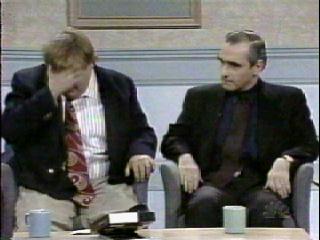
Chris Farley would sit in a cheap talk-show set with the week’s guest and hold an “interview.” Let’s say the guest was Keanu Reeves. The interview would go like this:
CHRIS: Hey, um, Keanu?
KEANU: Yeah?
CHRIS: Remember when you were in The Matrix?
KEANU: Yeah.
CHRIS: And you shot all those guys and flew and stuff?
KEANU: Yeah.
CHRIS: (Pauses, searching for words.) That was really cool.
An uncomfortable silence followed as the audience squirmed in embarrassment.
"The Chris Farley Show" provides a brilliant illustration of why the two Kill Bill movies are boring, empty failures. (Stick with me--I'll get to comics eventually.)
Before the first one came out, I thought the movie looked like it would be mega-cool. Quentin Tarantino making a movie celebrating the grindhouse crap cinema of his youth? Using said crap as inspiration and fuel? Oh hell yes. A talented filmmaker using his passions directly to make a popcorn movie? Oh hell yes!
One of the greatest popcorn movies ever, Raiders of the Lost Ark, was born of a similar idea. Spielberg and Lucas took the crap cinema of their youths as inspiration and fuel and produced a classic Big Loud Fun Movie. Few things in this world are better than Big Loud Fun Movies.*
When the movie hit town, my old roommates, a few college friends, and yers truly gathered together and trekked to see Kill Bill Part One, our brains jazzed for a rocket ride to kickassville.
By the time it was over, I was ready to use my own Five Fingers of Death to rip Tarantino’s nipples off.
I couldn’t believe it. The man pulled a Chris Farley.
You could almost hear him speak over the soundtrack: “You remember when Gordon Liu in Master Killer totally kicked ass on those guys that time? That was cool. Yeah. Or when Brian De Palma did that sweet-ass camera move? That was cool. Yeah.”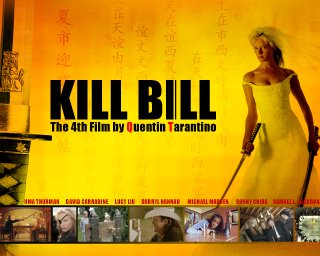
The whole goddamn movie was pastiche. He took scenes and ideas from his beloved crap movies and replayed them with his big-budget cast. The dumbass didn’t even bother to include that most basic of elements, a story.
What made Raiders of the Lost Ark a classic was not the inclusion of beloved elements from previous movies, but that Spielberg and Lucas made these elements their own, and told their own story. Tarantino didn’t bother. He didn’t take the kickass essence of the grindhouse to make something new. Oh no. Kill Bill was instead a clip show, a That’s Entertainment of violent b-movies.
Stringing together the favorite bits of your favorite movies doesn’t make for a great movie. It makes for a Crazy Quilt of Crap. A boring, deadly boring, somebody-make-the-bad-man-stop boring, Crazy Quilt of Crap.
This idea, as you would expect, takes us to punk icon Iggy Pop.
When Iggy started out, he was a wannabe bluesman in suburban Michigan. He aped the forms and played the songs he knew. A common story. But even as a teenager, he knew it wasn’t enough and that it wasn’t quite right. It felt hollow.
To learn more and figure out what was missing, he moved to Chicago and jammed with longtime bluesmen, men who had spent decades learning its nuances. The technical achievements of the older musicians flattened him. He worked hard to match them, and became a more proficient musician.
But more importantly, the Ig made a breakthrough. He didn’t want to play exactly like them, because he wasn’t them. He had to make it his own. The way to do that? Figure out what the others are trying to say, and say it in your own way.
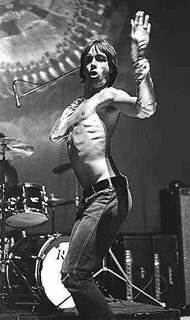
In the case of Iggy, he took the core idea and some of the techniques of his heroes, and crafted his own music. He started with Chicago blues and ended up making Raw Power.
So what does this have to do with comics and Gødland?
I’m sure you can see where I’m going with this.
I saw Tom Scioli’s book The Myth of 8-Opus at SPX 2004 and rolled my eyes. It seemed to me that Scioli couldn’t try to be Jack Kirby any more if he started smoking cigars and married a woman named Roz. Rather than throw what little money I had on what looked to be an obvious tribute book, I left the book behind. (The stuff I did buy that day was middling-to-bad. Pity.)
A recent bout of boredom with mainstream comics led me to try a bunch of new stuff, including Scioli’s latest book, a title written by Joe Casey and published by Image, Gødland.
The series centers on an astronaut turned demigod, Adam Archer. Archer was the sole survivor of a botched mission to Mars. After falling into a crevasse, he accidentally discovered a coven of powerful beings hidden in the Martian caves. Transformed by the strange beings into an energy-man for reasons unexplained, Archer returned to Earth and now intervenes when Big Cosmic Menaces emerge. He's kept by the military in a peculiar skyscraper in New York City, along with his three sisters, none of whom particularly want to be his keepers. The secrets of his transformation and the history of the universe are subplots that threaten to pop up, but haven't quite yet.
The first issue didn’t do a lot for me. Scioli’s ability to mimic late-period Kirby was impressive, yeah, but it was mostly a mess. Big green space dog? Dude who glowed? Mission to Mars? Que?
But I gave the book a chance and decided to pick up the next few. It’s up to issue five, Combat Rock.
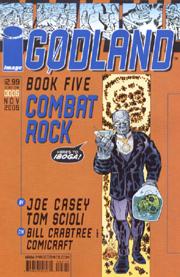
Oh man. Glad I did.
This is some good stuff.
Casey and Scioli produce a book that looks like a Kirby Tribute, but isn’t. They certainly know and love the old Kirby cosmic epics, yes. But instead of copying them or creating a lame pastiche, they did it right. Rather than ape the moves, they strove for the same goal as Kirby: Big Sweeping Cosmic Crazed Comics.
Below is a page from one of several late-Kirby cosmic epics, The Eternals. Like a lot of Late Kirby, The Eternals had gods, demons, and really, really big machines with inexplicable squiggles on them.
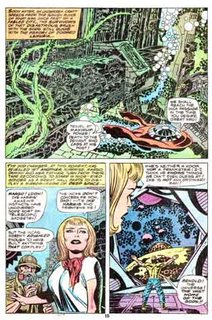
If you read a collection of The Eternals then sat down to Gødland, you’d recognize the similarity of the art and the bombast of it all. But it would feel different. For example, here's a page from issue 3. Very Kirby-esque, yes.
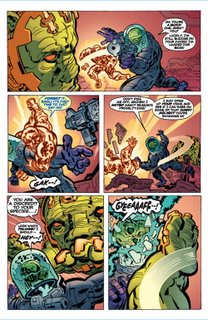
But there are key differences between the works. Kirby created his worlds of gods and demons and let them loose. The pagan divinities of his books stomped around as the focal points of the comics. Normal people did exist, but they tended to be plot points more than characters. The conflict between Darkseid and Orion dominated The New Gods, and little else mattered. Everyday life was a backdrop to Big Cosmic Action.
Casey and Scioli's book stresses the giant gulf between humanity and Big Cosmic Characters. The hero of Gødland, Adam Archer, began as a normal man and became something far more. The series depicts his efforts to deal with his new cosmic destiny. What's more, his family is both annoyed and jealous of his status as a cosmic demi-god. The machinations of epic villains play out alongside regular human drama between ordinary brothers and sisters. That's not a Kirby approach at all.**
In short, Casey and Scioli are telling a different kind of story than Kirby did. Like the Ig, they’re taking from their hero and predecessor what they like and then push forward with their own path. Gødland doesn’t want to be a Jack Kirby comic of the Big Sweeping Crazed variety. It wants to be a Big Sweeping Cosmic Crazed comic and uses some Kirby-esque means to do it.
The difference between the two is enormous.
A lot of comics creators don't understand the difference. Rather than dedicate themselves to the goals of their artistic heroes, they simply go through the same motions and hope it comes out to be as kickass as the original. And it never is. They produce boring and derivative schlock.
Casey and Scioli don't make that mistake. They understand the Lesson of Iggy. God bless 'em.
Because of that, Gødland is fine junk food. Yep. It's the comic equivalent of a bag of Fritos: bad for you and lacking in nutritive value, but packed with oily, salty goodness.
I loves me some Fritos.
---------------
Postscript:
The Lesson of Iggy came from an interview the illustrious Mr. Pop gave a couple of years ago. I think I read it online, but dammit, I can't find it. Reading Gødland reminded me of The Ig and his wisdom. If'n anybody can find that interview, I'd be beholden to you. Thanks.
--------------------------
*Okay, a lot of things are better than Big Loud Fun Movies. Like love. Or the delicate play of sunlight upon swaying blades of grass on a cool spring day. Or General Tso’s Chicken. I’m striving for rhetorical effect here, yo.
**I mean solo Kirby, not Lee/Kirby. The New Gods stuff, Kamandi, OMAC, etc.
Mega dittos. Great post.
ReplyDeleteYou can find the lesson of Iggy in the book Please Kill Me: The Oral History of Punk. It was one of my favorite quotes in the book.
ReplyDelete